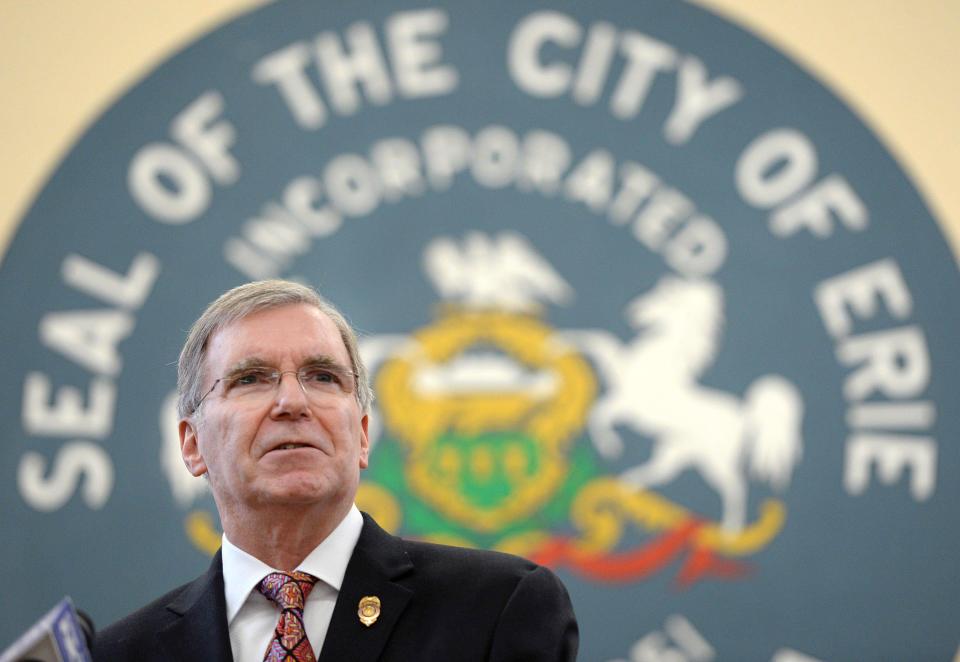Erie mayor unwilling to give up on $14.5M policing plan despite City Council resistance
- Oops!Something went wrong.Please try again later.
Erie Mayor Joe Schember will not abandon a multimillion-dollar effort to bring on new city police officers and enhance public safety despite an Erie City Council vote that threatens to derail the American Rescue Plan-funded initiative.
ARP policing plan:Amid crime surge, some Erie City Council members oppose hiring 9 new officers
City Council:Erie will get 9 new cops. But is ARP-funded policing plan dead?
However, Schember acknowledges that his administration now must find a way to sell Erie City Council on the need for and long-term benefits of the plan, which aims to address a surge in juvenile crime and other serious offenses in the city.

“We’re not giving up on this,” Schember said in an interview. “Many of our next steps are evolving. And we’re trying to figure out the exact approach in terms of pitching this to City Council again. We want them to see the value in this, because we really believe this plan will make a lot of lives better in the city of Erie.”
City Council on June 15, in front of a standing-room-only audience that included supporters and critics, approved the hiring of nine new police officers as part of the proposed $14.5 million policing plan.
The entire policing initiative was unanimously approved by the seven-member Erie City Council in December.
Police plan vote:City Council unanimously approves $14.5M initiative
Both Schember and Erie Bureau of Police Chief Dan Spizarny also want to bring on as many as 12 additional officers by the end of this year. The plan is being pitched in the aftermath of the April 5 shooting at Erie High School that injured one student and the fatal April 14 shooting of 7-year-old Antonio Yarger Jr. near his Downing Avenue home.
Erie High shooting:Teen defendant agrees to have case moved to adult court
The plan would also bring back the department's Juvenile Crime Unit, disbanded in 2005 because of city budget woes; reinstate the bureau's nine-officer Crisis Unit to handle crisis calls related to mental health, homelessness and domestic incidents; add officers to the police bureau's Neighborhood Action Team and the Police Athletic League and Community Outreach Program; and provide necessary training, equipment and vehicles to officers involved with those initiatives.
Fatality:17-year-old charged in Erie boy's killing was out on bond in another shooting

However, a resolution proposed by Councilman Chuck Nelson, approved by a 4-3 margin just minutes after council signed off on the new probationary police officers, has complicated things.
That resolution stipulates that by Jan. 1, 2024, the city'spolice bureau complement cannot exceed 175 members. The police bureau currently has 174 members; the nine new hires will bring the police complement to 183 officers.
If the city does not see enough police retirements or other employee departures by 2024, many of the nine probationary officers approved on Wednesday night could be laid off because of a lack of seniority.
The resolution could also prevent the city from hiring additional officers later this year, as planned, as part of the ARP policing initiative.
Nelson and his colleagues Ed Brzezinski, Jasmine Flores and Michael Keys have expressed concerns about the city’s long-term ability to afford the policing plan after the city’s ARP funding runs out. The plan uses a portion of the city’s $76 million ARP allocation.
Nelson and Flores joined City Council in January and had not yet been seated when the panel voted 7-0 on Dec. 1 to approve the ARP-funded public safety proposal.
Further, Nelson and others have also pointed out that the Erie Bureau of Police, budgeted at $39.6 million for 2022, already accounts for nearly 40% of the city's budget. Nelson has suggested that the city reallocate much of the $14.5 million Schember wants for the policing plan to other projects or programs.
The nine probationary officers, who will each start at an annual salary of $50,205, are scheduled to be sworn in on June 27.
“The primary concern I’ve heard from some of them on council is about finances and the possibility that this could lead to tax increases,” Schember said. “We wouldn’t put a plan in place that’s going to raise taxes. We’re looking for grants and other things to help us fund these officers and we think that attrition would be a part of this, too, since we have (police) retirements every year.”
Schember said police are moving forward with plans to reinstate the juvenile unit by September, despite council’s recent vote.
The nine new probationary officers will be assigned to patrol duties, and up to six current officers who are now “on the street” will work in the juvenile unit and receive specialized training for that assignment.
Schember added that additional pitches to City Council will largely focus on the benefits of reinstating highly-trained crisis officers to work closely with local social service providers.
“They’re so important. They allow us to have police officers trained to respond to incidents of domestic violence and mental health, to help the homeless, to have a better understanding of those situations,” Schember said. “Last week alone police handled 134 domestic violence calls. We think we can explain the logic here to council and point out to them why this is so important.”
In an e-mail to various city officials on June 16, Spizarny said police officials are ready to “reform our plan for what’s best moving forward.”
Addressing City Council’s votes, Spizarny wrote: "It takes a lot of trust to back someone else's plan and apparently I have not convinced them of our sincerity to do exactly what everyone wants, compassionate policing."
Renee Lamis, Schember's chief of staff, added that the city has significant community support for the policing plan, including from a number of social service providers.
"The mental health providers for example have been asking for the crisis car to come back for years," Lamis said, "because they know it's effective."
City Council President Liz Allen supports the policing plan along with colleagues Maurice Troop and Mel Witherspoon, and she backs Schember's approach.
"We have to re-frame this, and we have to do as effective a job as possible to tell stories and go beyond the statistics and put names and faces on the toll that violence is taking in Erie," Allen said.
Allen said she plans to use a portion of her time on the council dais "to inform the rest of council and the public" about various public safety initiatives in the city, including how police body cameras are working and what agencies that combat domestic violence are dealing with.
"We need to take another look at this plan," Allen said. "It's important that we do so."
Contact Kevin Flowers at kflowers@timesnews.com. Follow him on Twitter at @ETNflowers.
This article originally appeared on Erie Times-News: Erie Mayor Joe Schember says $14.5M policing proposal is not dead

